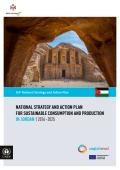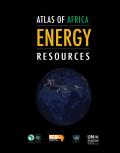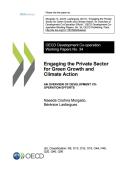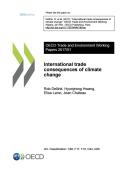
This resource is also available in Arabic.
The National Strategy and Action Plan for Mainstreaming Sustainable Consumption and Production into Agriculture/Food Production, Transport, and Waste Management Sectors in the Hashemite Kingdom of Jordan (2016-2025) aims at supporting the implementation of agreed on SCP strategic, operational objectives and actions at the national level. This document has been prepared in line with the regional SCP Action Plan for the Mediterranean, in cooperation with the SWITCH-Med Programme and financed by the European Union to support SCP common objectives in the region. Jordan’s SCP Strategy and National Action Plan (NAP) addresses key human activities, which have a particular impact on the Jordanian environment including marine and coastal areas and related transversal and crosscutting issues. It defines common objectives and identifies actions guiding the implementation of the SCP at the national level.

Developing Sustainable Consumption and Production (SCP) National Action Plans (NAP) contributes to poverty alleviation, environmental sustainability and the development of a green economy. SCP-NAPs are the first step in a country’s response to 2015 adopted Sustainable Development Goals (SDGs) and in particular Goal 12: Ensure Sustainable Consumption and Production patterns.
Between January and November 2015, in a multi-stakeholder and inclusive process, Lebanon developed a national SCP Action Plan for the Industrial Sector to promote Sustainable Consumption and Production patterns, with a special focus on the Litani Basin and Qaraoun Lake. The SCP Action Plan for the Industrial Sector in Lebanon has identified 3 operational objectives: Adopt Best Available Techniques to promote SCP in the industrial sector; Introduce SCP approaches related to the industrial sector in the policy and institutional frameworks; Educate and raise awareness of consumers on SCP in the industrial sector.

Low energy supply, complete with shortages, high costs and poor access, remains major impediments to Africa’s social and economic progress. The African Union’s Agenda 2063 commits to fast-tracking modern, efficient, reliable and cost effective renewable energy for all households, businesses, industries and institutions. To support this, in 2016, the African Development Bank approved its New Deal on Energy for Africa, which aspires to achieving universal access to energy by 2025, using the latest off-grid and technology solutions. This atlas illustrates the incredible transformation ahead.
Universal access requires large financial investments. By some estimates, Africa needs $43-55 billion per year until 2030-2040, compared to current energy investments of about $8-9.2 billion. To achieve closing that gap, an improved understanding of energy availability, distribution and limitations is one of many crucial needs. In response, the African Development Bank, Sustainable Energy Fund for Africa and the Infrastructure Consortium for Africa, worked with UN Environment and produced this Atlas of Africa Energy Resources.

The private sector plays an important role in enabling or hindering green growth in developing countries. With increasing emphasis for development co-operation providers to engage private actors, there is a need for a sound understanding of the theory of change and the efficacy of private sector engagement approaches in supporting environment and development outcomes.
This paper contributes to this agenda and helps inform efforts of development assistance provider. It maps the major approaches used to engage the private sector, i.e. to mobilise private climate investment, promote green private sector development and harness the skills and knowledge from private actors, and highlights some challenges and lessons learned. The paper also provides an estimate of climate-related development finance targeting private sector engagement.

This report provides an analysis of how climate change damages may affect international trade in the coming decades and how international trade can help limit the costs of climate change. It analyses the impacts of climate change on trade considering both direct effects on infrastructure and transport routes and the indirect economic impacts resulting from changes in endowments and production. A qualitative analysis with a literature review is used to present the direct effects of climate change. The indirect impacts of climate change damages on trade are analysed with the OECD’s ENV-Linkages model, a dynamic computable general equilibrium model with global coverage and sector-specific international trade flows. By building on the analysis in the OECD (2015) report "The Economic Consequences of Climate Change", the modelling analysis presents a plausible scenario of future socioeconomic developments and climate damages, to shed light on the mechanisms at work in explaining how climate change will affect trade.
